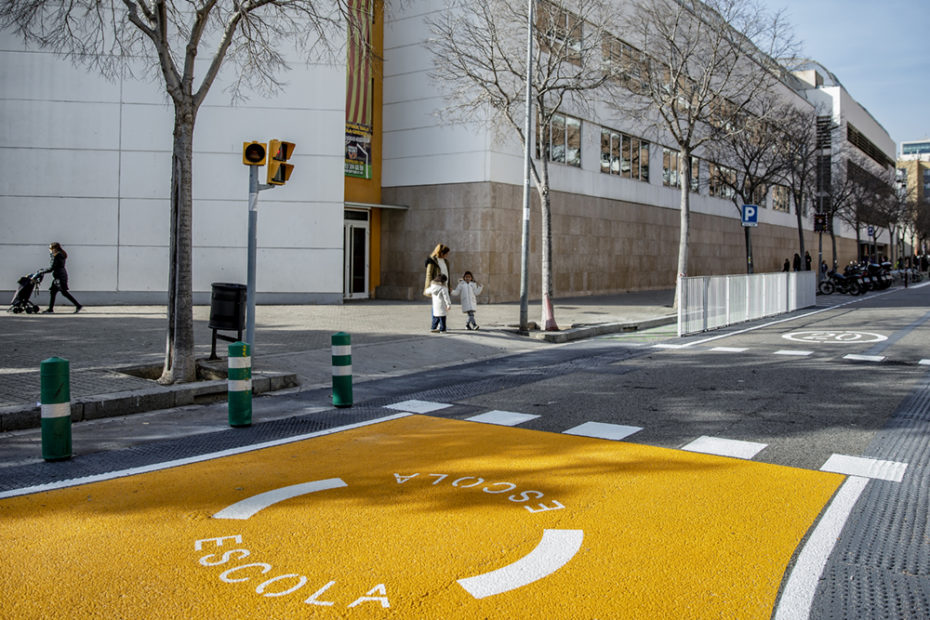To continue the reflection about Lisbon, Barcelona and Rome after the edition of Café com Luta on “Local powers and the pandemic in Southern Europe” (28/05/2020, org. Friedrich Ebert Foundation, ICS’s Urban Transitions Hub and Transparent International in Portugal), this text is aimed to summarise some ideas regarding the pathways from this pandemic crisis towards the future, namely from Amedeo Ciaccheri (8th District at Rome), Elena Tarifa (Barcelona en Comú), Rogério Roque Amaro (ISCTE-IUL) and Bárbara Ferreira (ISEG-UL), in dialogue with the organizers and participants of this event.
Urban transformation – reorganizing public space and imagining for a future
Children and education
One of the key areas to reflect in Southern European cities in the aftermath of the COVID-19 pandemic (and considering the risk of its persistence) is the reorganization of public space. For the cities represented in these events, one of the main dimensions referred for reorganization was related to children and education, thus highlighting the need to guarantee a proper space for the development, learning and safe growth of the youngest inhabitants in our cities. Children’s needs in public space further include the shared “back to school challenge”, which can be considered in a collaborative way to broaden formal educational spaces towards outside the school buildings, namely through the organization of activities in different social centres and open spaces, this way guaranteeing more space-related safety. In this context, both the needs of children and social mediation can better be met through the involvement of different key actors in this process, particularly educational staff, children and their home/family educators.
Space to move
Regarding the adaptation of public space for the whole population, it is important to consider the overall threat — previous to a COVID-marked context — and impact of climate change and the associated commitments of urban adaptation and mitigation, which often imply a considerable change in mobility patterns, dynamics and infrastructures. In the present context, this requirement has been aggravated by the need to diminish physical co-presence, particularly in larger groups, thus privileging extended and safe outdoor spaces for people to walk and ride in autonomous mobility, considering the higher risk of moving in collective transport. Notwithstanding the urgency of providing safe public transport, the effort on turning public space more friendly for walking and other soft mobility options can have future benefits, and some adaptations made during the COVID-19 emergency — like Barcelona’s closure of traffic in some avenues to guarantee that walkers have more space to be in the street — could stay for longer.
Community and commons
Beyond these dimensions, the post-COVID city must keep on being imagined, giving room to radical, innovative projects and creative solutions, leaving no one behind and promoting the rebuilt of life in public space. For Amedeo, afar from building another idea of urbanism, this is the time to transform our cities in such a way that the relationships inside the community can also be restored, particularly by promoting the sustainability of local networks and services, much more than focusing on recovery ideas based in a general economic process without a deeper local impact. All speakers considered this idea through the chance to increase the focus on local, proximity economy. Roque Amaro further added the need for a democratic and ecological-sensitive solidarity, promoting a new economy and ecology of life, along with a view of community as another player in how we see regulation — considering the commons beyond the spheres of public and private.
Strengthening the public debate
This year’s pandemic experience is certainly to be considered a context of emergency with a lot of critical dimensions in need of immediate answer and preparation for future adaptations. Yet, it is also possible — and needed — to broaden the reach of such issues by bringing them into public debate. From Barcelona and Rome, for example, the importance of bringing into public the need for children to go outside and to collectively rethink the necessary reopening of schools was highlighted — in Elena’s words, “life is also politics” and the issues at stake include the rights to education and socialization beyond the lock down, as well as answering to food and housing needs while bringing to the front discussions about basic and minimum income, and reinforcing the fight for housing rights.
Review article by Inês Vieira (ines.vieira@fcsh.unl.pt)
Photo: “Protegim les escoles”, program creating new squares in front of schools, Barcelona, 2020
